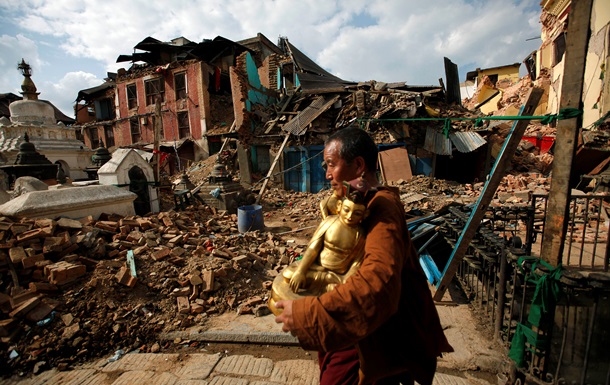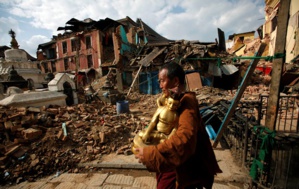A few days after a major earthquake in Nepal, clashes among the population over the water have begun. According to UNICEF, the problem of drinking water is the most urgent. In the town of Bhaktapur, near the capital of Nepal - Kathmandu, only 20 percent of the population has access to it. In addition, toilets urgently required.
- Contaminated water and appalling sanitary conditions may lead to the rapid spread of disease, - said Christian Schneider, head of the German branch of the UN Children's Fund UNICEF. The organization warns that without increased aid to the affected region "disaster after disaster"can begin.
The Minister of Information and Communications of Nepal Minendra Rijal noted the difficulties in coordinating aid. The disaster is so broad and unprecedented that we cannot meet the expectations of the people, - he said in an interview with local television station Kantipur.
The rescue from the rubble
The country's only international airport in Kathmandu proved unsuitable for a large number of aircrafts. Because of this, some of them, including rescuers, had a long time to wait for permission to land. In addition, many rescuers appeared "locked" in the capital, as due to debris on the streets have not been able to reach more remote areas around the earthquake epicenter. According to the UN, 54 rescue teams from 22 countries are working in Nepal.
Sometimes the affected area delivers good news: in Kathmandu rescuers pulled from the rubble a teenage survivor. Basically the bodies are retrieved: at last count, they have about 5,500, at least 10,000 people were injured. About a hundred dead in neighboring countries - India and China - are added to this.
The uneven distribution of aid
But even the available assistance is unevenly distributed. “The facts show that tourists are served in the first place, and many others injured are sidelined - said Rainer Brockhaus, president of the humanitarian organization Entwicklung Hilft. - Helicopters fly to where they are paid."
The earthquake destroyed more than 70,000 homes, and about 530,000 were damaged. Charitable Organization of the United Nations requires about 380 million euros for the provision of further emergency. These and other facilities over the next three months to be used to support half a million people of Nepal, left over homeless from the cataclysm.
Europe’s help
The Commission has identified three million euros in immediate aid over the weekend. In addition, the EU Member States to collect at least 25 million euros, it said in Brussels. Under the leadership of the EU, to date, 15 EU countries as well as Norway, have provided material assistance and formed rescue teams.
source: dw.de
- Contaminated water and appalling sanitary conditions may lead to the rapid spread of disease, - said Christian Schneider, head of the German branch of the UN Children's Fund UNICEF. The organization warns that without increased aid to the affected region "disaster after disaster"can begin.
The Minister of Information and Communications of Nepal Minendra Rijal noted the difficulties in coordinating aid. The disaster is so broad and unprecedented that we cannot meet the expectations of the people, - he said in an interview with local television station Kantipur.
The rescue from the rubble
The country's only international airport in Kathmandu proved unsuitable for a large number of aircrafts. Because of this, some of them, including rescuers, had a long time to wait for permission to land. In addition, many rescuers appeared "locked" in the capital, as due to debris on the streets have not been able to reach more remote areas around the earthquake epicenter. According to the UN, 54 rescue teams from 22 countries are working in Nepal.
Sometimes the affected area delivers good news: in Kathmandu rescuers pulled from the rubble a teenage survivor. Basically the bodies are retrieved: at last count, they have about 5,500, at least 10,000 people were injured. About a hundred dead in neighboring countries - India and China - are added to this.
The uneven distribution of aid
But even the available assistance is unevenly distributed. “The facts show that tourists are served in the first place, and many others injured are sidelined - said Rainer Brockhaus, president of the humanitarian organization Entwicklung Hilft. - Helicopters fly to where they are paid."
The earthquake destroyed more than 70,000 homes, and about 530,000 were damaged. Charitable Organization of the United Nations requires about 380 million euros for the provision of further emergency. These and other facilities over the next three months to be used to support half a million people of Nepal, left over homeless from the cataclysm.
Europe’s help
The Commission has identified three million euros in immediate aid over the weekend. In addition, the EU Member States to collect at least 25 million euros, it said in Brussels. Under the leadership of the EU, to date, 15 EU countries as well as Norway, have provided material assistance and formed rescue teams.
source: dw.de






